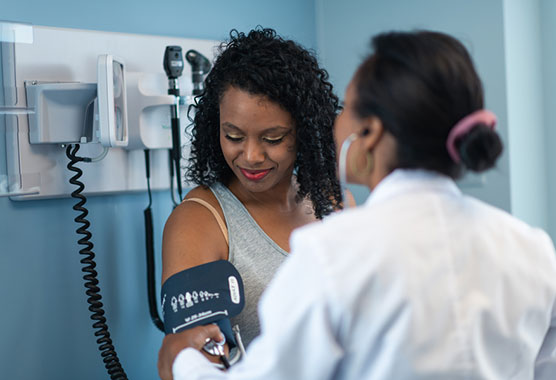Abdominal Aortic Aneurysm
An abdominal aortic aneurysm is a life-threatening but often preventable condition. Trust our experts to keep you as safe as possible.
Medically reviewed by Mimmie Kwong, M.D. on Nov. 14, 2023.

What Is an Abdominal Aortic Aneurysm?
Your aorta is your body’s largest artery and delivers blood and oxygen to your organs. An abdominal aortic aneurysm is where the vessel wall becomes dilated in the section of your aorta between the chest and pelvis. At this area of dilation, the vessel wall is weakened and can rupture. This puts you at risk for life-threatening complications.
The UC Davis Health Vascular Center is home to highly skilled specialists offering a depth of abdominal aortic aneurysm experience. We often detect aneurysms before they are large enough to cause symptoms. Our team provides appropriate care, including medical therapies, minimally invasive procedures, or surgical interventions for your aneurysm, which will lower your risk of rupture and death.
Abdominal Aortic Aneurysm Symptoms
An abdominal aortic aneurysm typically does not cause symptoms. You might not even know you have one. Aneurysms that grow very fast or become inflamed can cause abdominal or back pain. A rupture will cause an acute loss of blood, immediately making you feel unwell.
Emergency Aortic Aneurysm Symptoms
An aortic aneurysm rupture is a medical emergency. Seek immediate treatment if you experience:
- Difficulty breathing
- Low blood pressure
- Moist, cool or pale skin
- Nausea and vomiting
- Rapid heartbeat
- Shortness of breath
- Sudden, severe pain
Causes and Risk Factors of Abdominal Aortic Aneurysm
Experts aren’t sure what causes abdominal aortic aneurysms. People with certain risk factors are more likely to develop them.
Age
Your risk increases with age, especially if you are 60 or older.
Biological Sex
People assigned male at birth are more likely to experience an abdominal aortic aneurysm.
Family History
Your risk increases if a blood relative had an aortic aneurysm.
Other Medical Conditions
Certain medical conditions can increase your chances of having an aortic aneurysm. They include connective tissue disorders and high blood pressure.
Tobacco Use
Smoking damages your abdominal aorta creating weak spots that allow aneurysms to form.
Abdominal Aortic Aneurysm Diagnosis and Testing
Imaging studies, including ultrasound and CT scans, are some of the more common testing methods for an abdominal aortic aneurysm. At UC Davis Health, you receive services from our accredited vascular laboratory. We offer timely, accurate aneurysm testing that leads to precise care.
We sometimes detect aneurysms in imaging studies for other conditions. UC Davis Health uses artificial intelligence software to comb our systemwide medical records and identify at-risk patients. If we notice a potential aneurysm, a team member contacts you to coordinate additional testing.
Abdominal Aortic Aneurysm Treatments
Vascular specialists develop a personalized aortic aneurysm plan based on your medical needs and personal preferences.
Conservative Therapy
Small aneurysms might not require repair. We may recommend quitting smoking and managing your blood pressure with medications to prevent the aneurysm from growing.
Endovascular Aneurysm Repair (EVAR)
This is a minimally invasive operation where we go through the inside of your blood vessel to access the aneurysm. We make small incisions in your groin to get to the blood vessels. Through this, we place a hollow device (stent graft) that reinforces and relines your aorta walls, enabling blood flow through the stent graft instead of filling the aneurysm.
Open Surgical Aneurysm Repair
In patients whose aneurysms are not suitable for EVAR or in whom alternative approaches are preferred, we offer open surgical treatment for abdominal aortic aneurysms. Open repair is a highly durable operation that involves larger incisions to remove the aneurysm and replace it with a fabric tube.
Abdominal Aortic Aneurysm Prevention
Protecting your vascular health can lower the risk of an abdominal aortic aneurysm. If you have one, these steps can prevent it from growing and rupturing.
Avoid Tobacco
If you smoke, get the support you need to quit for good.
Eat a Healthy Diet
Consume a balanced diet of lean proteins and fresh fruits and vegetables. Limit your intake of highly processed, fatty foods.
Keep Other Medical Conditions Under Control
Follow care instructions, including taking medications and keeping follow-up appointments.
How common is abdominal aortic aneurysm?
200KPeople in the U.S. are diagnosed each year
How serious is a ruptured abdominal aortic aneurysm?
10thLeading cause of death in U.S. men older than 55
Source: UC Davis Health News: Abdominal Aortic Aneurysm Surveillance Program Saving Lives
Request an Appointment
As Sacramento's No. 1 hospital, you'll benefit from unique advantages in primary care and specialty care. This includes prevention, diagnosis and treatment options from experts in 150 specialties.
Referring Physicians
To refer a patient, submit an electronic referral form or call.
800-4-UCDAVIS
Patients
Call to make an appointment.
Consumer Resource Center
800-2-UCDAVIS

Ranked among the nation’s best hospitals
A U.S. News & World Report best hospital in cardiology, heart & vascular surgery, diabetes & endocrinology, ENT, geriatrics, neurology & neurosurgery, and pulmonology & lung surgery.

Ranked among the nation’s best children’s hospitals
U.S. News & World Report ranked UC Davis Children’s Hospital among the best in pediatric nephrology, orthopedics*, and pulmonology & lung surgery. (*Together with Shriners Children’s Northern California)

Ranked Sacramento’s #1 hospital
Ranked Sacramento’s #1 hospital by U.S. News, and high-performing in aortic valve surgery, back surgery (spinal fusion), COPD, colon cancer surgery, diabetes, gynecological cancer surgery, heart arrhythmia, heart failure, kidney failure, leukemia, lymphoma & myeloma, lung cancer surgery, pacemaker implantation, pneumonia, prostate cancer surgery, stroke, TAVR, cancer, orthopedics, gastroenterology & GI surgery, and urology.

The nation’s highest nursing honor
UC Davis Medical Center has received Magnet® recognition, the nation’s highest honor for nursing excellence.

World-class cancer care
One of ~59 U.S. cancer centers designated “comprehensive” by the National Cancer Institute.

A leader in health care equality
For the 13th consecutive year, UC Davis Medical Center has been recognized as an LGBTQ+ Healthcare Equality Leader by the educational arm of America’s largest civil rights organization.

